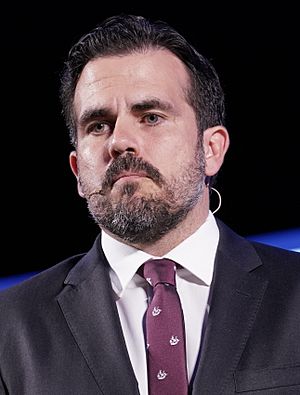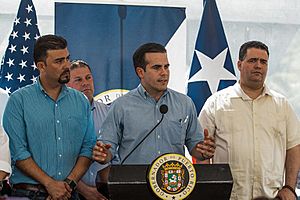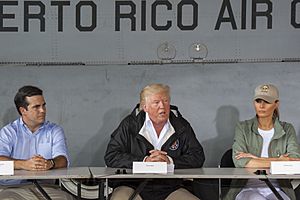Ricardo Rosselló facts for kids
Quick facts for kids
Ricardo Rosselló
|
|
|---|---|

Rosselló, photographed in 2019
|
|
| Shadow Member of the U.S. House of Representatives from Puerto Rico |
|
| In office July 7, 2021 – December 31, 2024 |
|
| Preceded by | Charlie Rodríguez |
| Succeeded by | Vacant |
| Governor of Puerto Rico | |
| In office January 2, 2017 – August 2, 2019 |
|
| Preceded by | Alejandro García Padilla |
| Succeeded by | Pedro Pierluisi (judicially annulled) Wanda Vázquez Garced (constitutionally appointed) |
| President of the New Progressive Party | |
| In office June 5, 2016 – July 22, 2019 |
|
| Preceded by | Pedro Pierluisi |
| Succeeded by | Thomas Rivera Schatz (acting) |
| Personal details | |
| Born |
Ricardo Antonio Rosselló Nevares
March 7, 1979 San Juan, Puerto Rico |
| Political party | New Progressive |
| Other political affiliations |
Democratic |
| Spouses |
Natasha Marie Cervi
(m. 2008; div. 2010)Beatriz Areizaga
(m. 2012) |
| Children | 2 |
| Parents | Pedro Rosselló Maga Nevares |
| Education | Massachusetts Institute of Technology (BS) University of Michigan (MS, PhD) |
Ricardo Antonio Rosselló Nevares (born March 7, 1979) is a Puerto Rican scientist, professor, and former politician. He served as the Governor of Puerto Rico from 2017 to 2019. He is the son of Pedro Rosselló, who was also a governor of Puerto Rico.
Before entering politics, Rosselló was a scientist. He studied at top universities like the Massachusetts Institute of Technology (MIT) and the University of Michigan. His research focused on neurobiology (the study of the brain) and stem cells, which are special cells that can help the body heal.
In 2019, Rosselló resigned as governor after large public protests. The protests happened after private chat messages between him and his staff were released to the public. The messages contained disrespectful comments. Later, an independent investigation found that the chat messages had been changed and were not the original ones.
After leaving office, Rosselló returned to his work in science and teaching. In 2021, he was elected as a shadow member to the U.S. Congress, representing Puerto Rico's interests.
Contents
Early Life and Education
Ricardo Rosselló was born in San Juan, Puerto Rico. His father, Pedro Rosselló, was the governor of Puerto Rico from 1993 to 2001. Growing up, Ricardo was very good at math and even competed in the International Mathematical Olympiads.
He went to high school at Colegio Marista Guaynabo. For college, he attended the Massachusetts Institute of Technology (MIT), where he earned a degree in biomedical engineering and economics in 2001. He continued his studies at the University of Michigan, earning a Ph.D. in biomedical engineering. He also did advanced research at Duke University in neurobiology.
Career Before Politics
Scientific Work
For 15 years, Rosselló worked as a researcher in the field of stem cells and bioengineering. He worked at several universities, including MIT, Duke University, and the University of Puerto Rico. His research focused on how stem cells could be used to treat diseases like cancer and diabetes.
One of his important projects involved "reprogramming" stem cells. This means changing them so they can be used to repair damaged tissues in the body. His work was featured on the cover of a major science journal, the Proceedings of the National Academy of Science.
Getting into Politics
Rosselló first became involved in politics in 2008. He supported Hillary Clinton and later Barack Obama in their presidential campaigns. He also wrote articles about politics and science for a newspaper in Puerto Rico.
In 2012, he started a group called Boricua ¡Ahora Es! which means "Boricua, Now is the Time!" A "Boricua" is a person from Puerto Rico. The group's goal was to support the idea of Puerto Rico becoming a U.S. state. This is known as the statehood movement.
Governor of Puerto Rico
Running for Governor
By 2013, Rosselló began creating a "Plan for Puerto Rico." This was a detailed plan to solve the island's economic problems. He traveled to other countries to learn how they handled similar challenges.
On September 19, 2015, he announced he would run for governor. On November 8, 2016, Rosselló won the election with 41% of the vote, defeating five other candidates. He was sworn in as governor on January 2, 2017.
Time in Office

When Rosselló became governor, Puerto Rico was facing a major debt crisis. The government owed over $70 billion. Rosselló's administration took steps to manage the debt and cut government spending.
Key Policies
- Economic Reforms: He signed laws to make it easier for businesses to open and create jobs. He also worked to reduce the size of the government to save money.
- Equal Pay: In 2017, he signed the Equal Pay Act, a law to make sure women and men get paid the same for the same work.
- Education Reform: He passed a law to change the education system by introducing charter schools and school vouchers. The goal was to give families more choices for their children's education.
- Environment: Rosselló passed laws to reduce pollution and move Puerto Rico toward using more renewable energy, like solar and wind power.
Hurricane Maria and Recovery
In September 2017, Hurricane Maria, a powerful storm, hit Puerto Rico. It caused massive damage across the island. Rosselló's government worked with the U.S. government to lead the recovery efforts.
His administration secured billions of dollars in federal aid to help rebuild homes, businesses, and roads. However, the recovery was slow, and many people were without power and clean water for a long time.
Views on Statehood
Rosselló strongly believed that Puerto Rico should become the 51st state of the U.S. He argued that statehood would help the island's economy and give its citizens full voting rights.
In 2017, he held a vote, called a plebiscite, on the island's political status. Over 97% of voters chose statehood. However, not many people voted, so the results were questioned.
Resignation in 2019
In July 2019, a major controversy began when hundreds of pages of private chat messages were leaked. The chats were between Governor Rosselló and his top aides. The messages contained insulting and disrespectful language about other politicians, journalists, and ordinary citizens.
The leak caused huge protests across Puerto Rico. Hundreds of thousands of people marched in the streets, demanding that Rosselló resign. At first, he said he would not step down, but as the protests grew, he announced his resignation on July 24, 2019. He officially left office on August 2.
In 2020, an independent prosecutor investigated the chats and concluded that they were "not original, edited, and manipulated." The report also stated that there was no evidence of crimes in the chats.
Life After Governorship
After leaving office, Rosselló returned to his career in science and education. He is currently an officer at the Regenerative Medicine Institute, a research center in Costa Rica. He also teaches at George Mason University and continues his stem cell research at the Ana G. Méndez University in Puerto Rico.
In 2021, he was elected as a shadow member of the U.S. Congress. In this role, he advocates for Puerto Rico's interests in Washington, D.C., especially for statehood.
In 2024, he published a book called The Reformer’s Dilemma, which is about his time in politics.
Personal Life
Rosselló married Beatriz Areizaga in 2012. They have two children, a daughter named Claudia Beatriz and a son named Pedro Javier.
His cousin, Roy Rosselló, was a member of the popular boy band Menudo.
See also
 In Spanish: Ricardo Rosselló para niños
In Spanish: Ricardo Rosselló para niños
- List of Puerto Ricans


